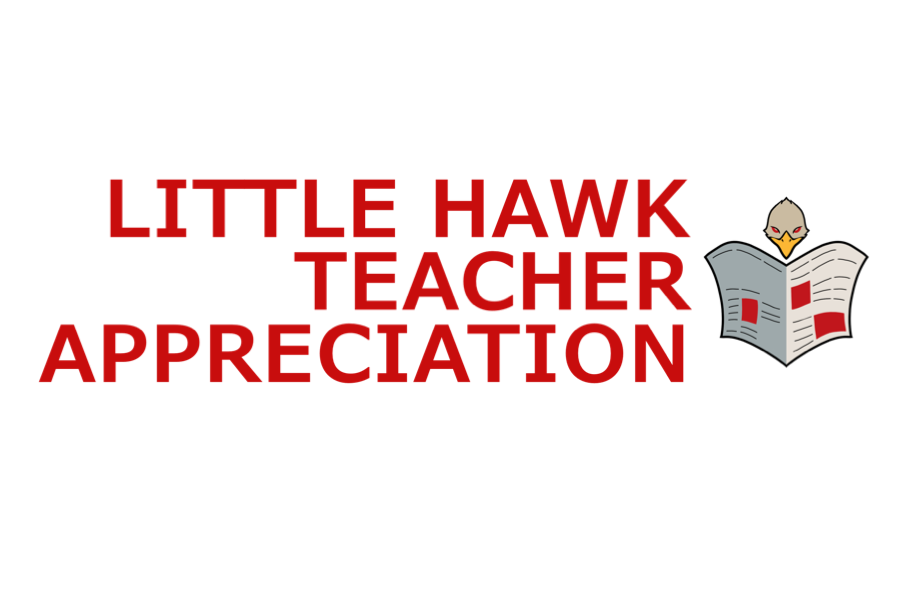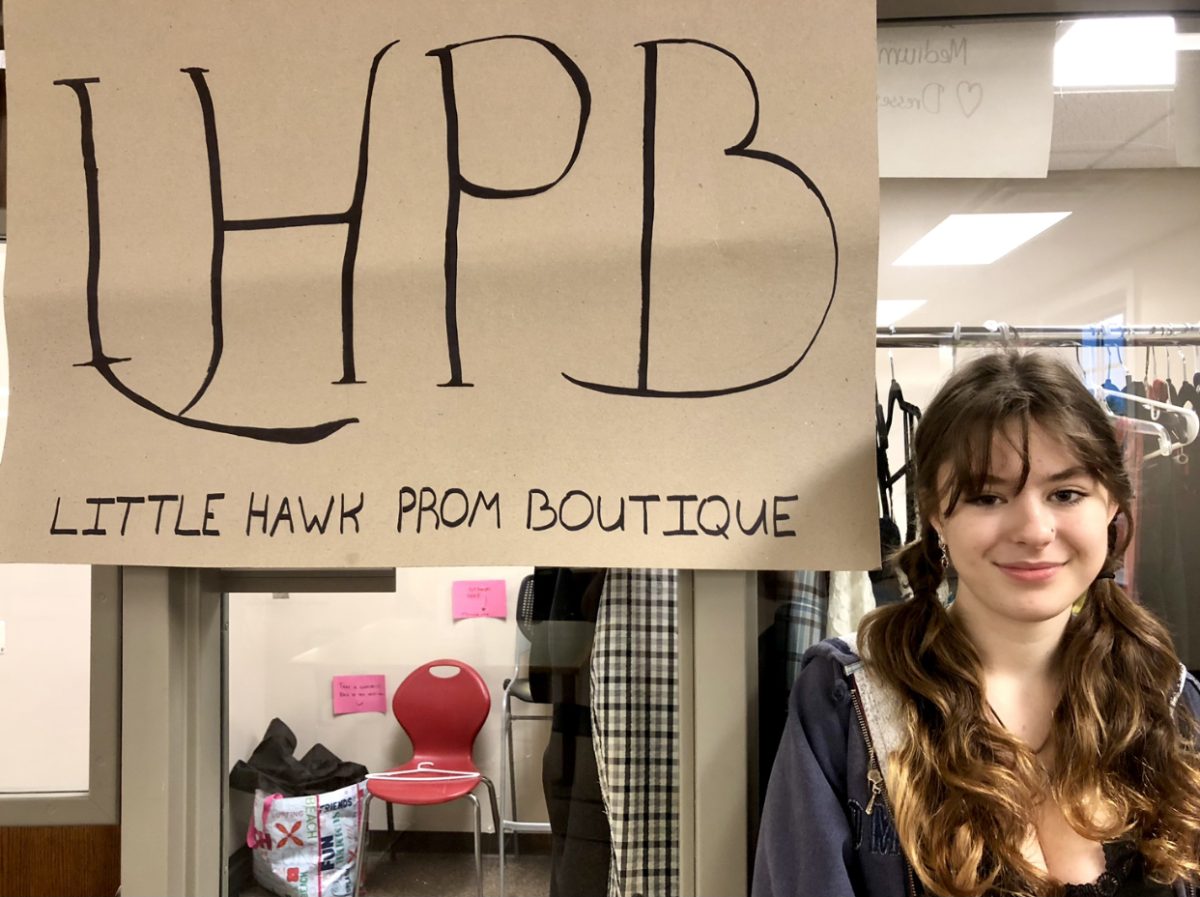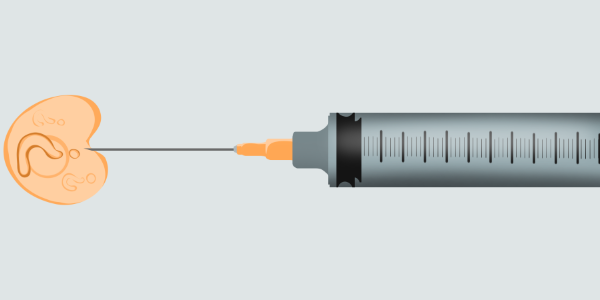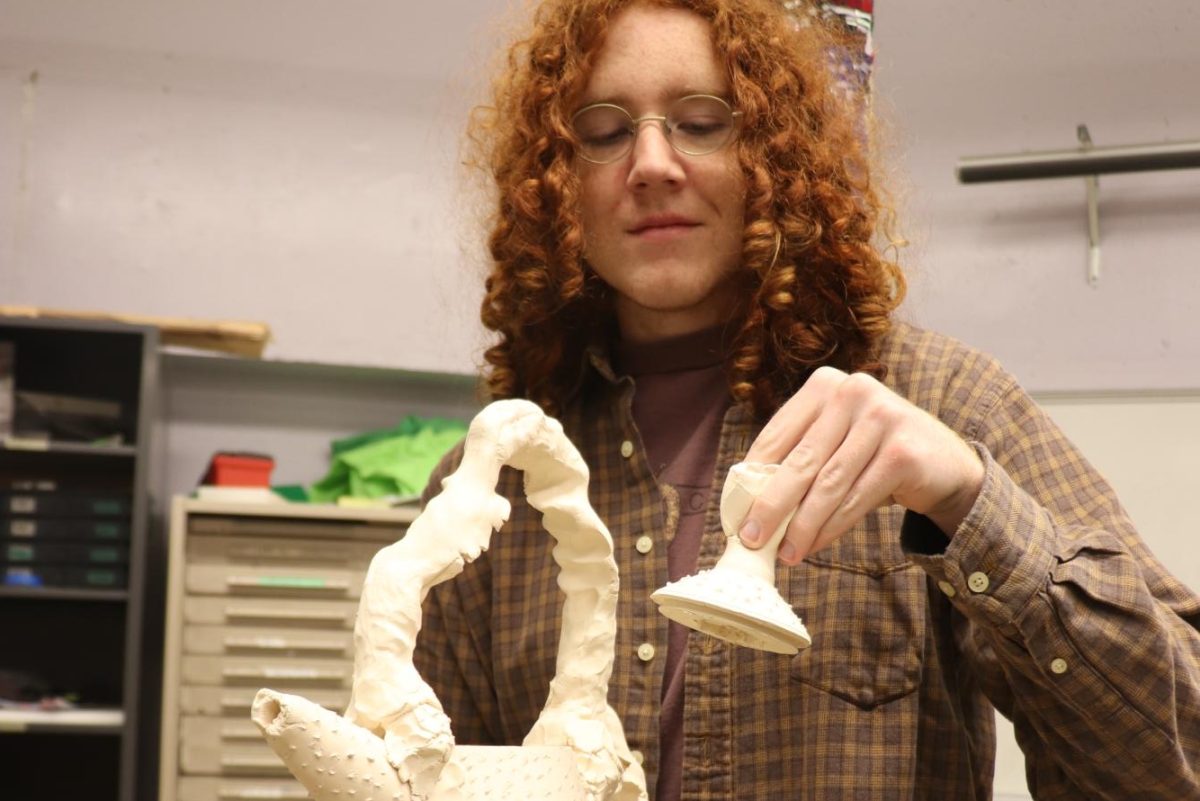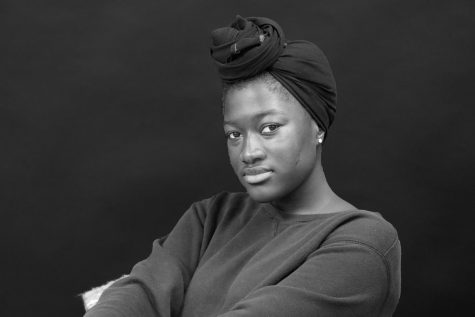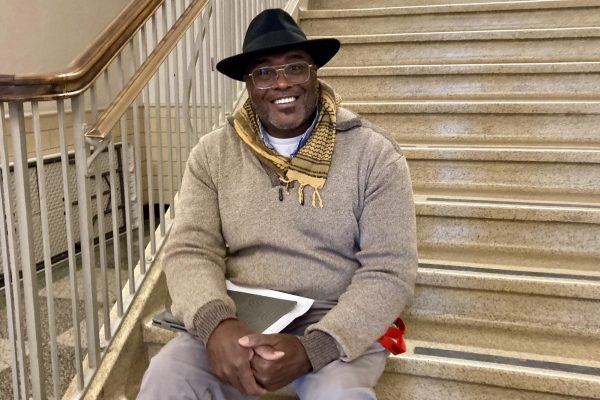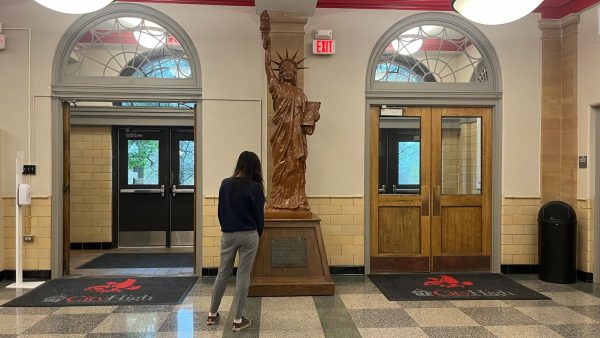HeForShe sponsors free menstrual hygiene product initiative
Periods can prove daunting for students who lack access to menstrual hygiene products.
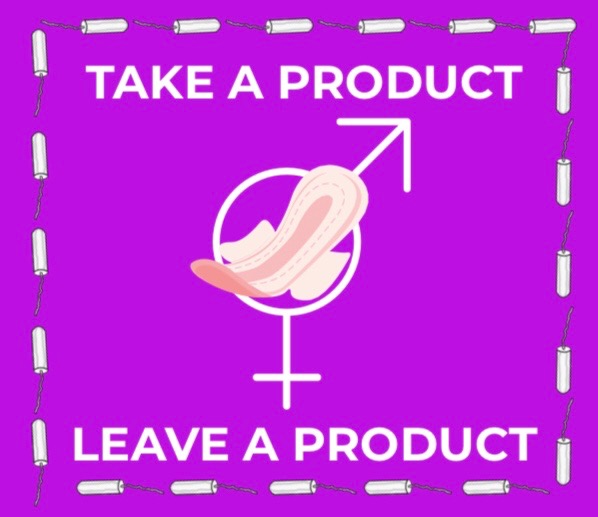
Students are now encouraged to leave menstrual hygiene products in bathrooms at City High for others in need.
Your menstrual cycles begins in the midst of a school day; frantic, you ask friends, neighbors, and even casual acquaintances for a pad, tampon, or other menstrual hygiene product; empty-handed, desperate, you waddle to the health office, or alternatively, shove some toilet paper in your underwear and call it a day; one month later, hit ‘repeat’.
Nina Lavezzo-Stecopoulos ‘20 was only in junior high when she began to notice this trend amongst her friends and acquaintances at school.
“They would go to the lunch ladies and ask if they could have change from their accounts so they could buy [menstrual hygiene products] because they were available for 25 cents or something but in junior high, we didn’t carry around backpacks so it was very rare for anyone to have [hygiene products],” Lavezzo-Stecopoulos said.
They would go to the lunch ladies and ask if they could have change from their accounts so they could buy [menstrual hygiene products] — Nina Lavezzo-Stecopoulos
Though Lavezzo-Stecopoulos never found herself playing out this bloody scenario in the hallways of her junior high, the experience of witnessing it play out never left her. As she got older, she even began to consider the problem on a broader scale.
“I assume that there were probably some students who didn’t even have access to [menstrual hygiene products] in other situations and that this is a very simple and cheap health product that should be available to students and is pretty easily available in other areas,” Lavezzo-Stecopoulos said.
This is exactly what she told Iowa City Community School District Superintendent Stephen Murley when she met him at a town hall that was being held at South East Junior High, where Lavezzo-Stecopoulos was a student at the time.
At the time, Superintendent Murley informed her that he would be better suited to follow up with her concerns at a later date. Thus began a long chain of email correspondences back and forth between the two.
“I would send email…after email and [Superintendent Murley] would respond (not very frequently) and eventually connect me to one of the health supervisors of the district, who didn’t respond that often either,” Lavezzo-Stecopoulos said.
Lavezzo-Stecopoulos was right about the presence of students who completely lack access to menstrual hygiene products outside of school. One article published in the “Rhode Island Medical Journal” noted that 86% percent of non-homeless women in the United States report having started their period in public without supplies. 79% of those who menstruate have used toilet paper or “some unhealthy and unsafe object” because their periods started while they did not have access to adequate hygiene products.
In June of 2016, “The Washington Post” reported that the city of New York would become the first to legally mandate the provision of free menstrual hygiene products to women in public schools, prisons and homeless shelters.
More and more college campuses around the nation have also begun to provide this service to menstruating students. More recently, Yale University, Columbia University, and Boston University, have all taken on the responsibility of providing hygiene products to their respective student bodies.
It took a couple more years after the initial townhall at South East for Lavezzo-Stecopoulos to finally secure a meeting with district administrators on the issue. By that time, she had already left junior high and was enrolled at City High.
“[Administrators] came to the conclusion that there weren’t really the means to provide [hygiene products] and if I wanted to raise money or something, that was another story,” said Lavezzo-Stecopoulos. “But if they were to provide anything, it would be reusable, cloth, sanitary napkins for lower-income students, which is kind of nasty, in my opinion.”
Low-income and homeless students who menstruate must juggle the added burdens of dealing with a period, all while still attempting to accomplish academic success. According to Janet Upadhye, a reporter for Bustle, things like socks, plastic bags, cotton balls, clothing items, and other materials may be substituted in the absence of menstrual hygiene products.
Despite the pressing need, after her unfruitful meeting with administrators, Lavezzo-Stecopoulos’s hope for the institutional provision of complimentary sanitary products in schools laid dormant for a while. That is, until a friend approached her with a variation of her initial idea during her junior year.
“We decided to create more of a student-led system where individuals would bring their own pads and then students could take them,” said Lavezzo-Stecopoulos. “So whenever you’re in a tricky situation, those [products] are there readily available for you And you can provide those accommodations for others whenever you have an extra.” Whenever you’re in a tricky situation, those [products] are there readily available for you And you can provide those accommodations for others whenever you have an extra. — Nina Lavezzo-Stecopoulos
Together, the two approached City High’s chapter of HeForShe, which is responsible for running the Tampon Tuesday sale, which provides menstrual hygiene products and fundraises for women’s shelters in the Iowa City area. From this collaboration, a new project was born.
This initiative, candidly labeled Take-A-Product, Leave-A-Product [TAPLAP] now operates out of eight of City’s women’s bathrooms as well as the gender-neutral bathroom.
“I think it’s a nice system to put in place for girls to help each other out, as well as the non-binary and gender-neutral bathroom, because not only women get their periods,” said Yardley Whaylen, one leader of City High’s HeForShe chapter.
City High HeForShe used Tampon Tuesday donations to fund the purchase of nine inexpensive plastic baskets that now rest in several City High restrooms, and place the first nine tampons and six pads in each one. For now, the plan is to monitor weekly circulation of the products in each basket.
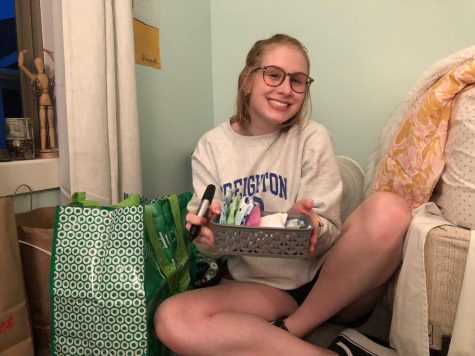
Yardley Whaylen ’20, holds a TAPLAP basket, filled with products donated by HeForShe.
I would hope that other girls take part in leaving products so that we can keep this system open and available for people all around the school for people who might need it,” said Whaylen. “If they become low, we obviously have products to spare that we can fill them [with] but we would love it if people could take it upon themselves to take one and leave one when they can.”
While she is glad that her junior high-era wishes have finally gained some traction, Lavezzo-Stecopoulos does predict some bumps in the road.
“Personally, I don’t know how often I will remember to leave a [product] for other students. I don’t know how often individuals will participate in the taking and leaving of a [product],” said Lavezzo-Stecopoulos. “But my hope would be to eventually raise money or get the district to provide money to just facilitate [feminine hygiene products] to always be in there and then students can always help the cause.”
The average person goes through about twenty hygiene products during their menstrual cycle. Outside of being blindsided by a period while at school, students who simply cannot afford to go out and buy menstrual hygiene products must rely solely on the ones provided to them at school.
TAPLAP has now been implemented at City, but it has not and will not replace the feminine hygiene products that have always been available in health offices across the school district. However, as Whaylen notes, the experience of trekking to the health office in pursuit of these products is not a pleasant one.
“When girls…find out that they’re on their period, then…they often have to use toilet paper and waddle down and have a very unpleasant experience,” said Whaylen. “It would be nice if there were ones right available [in the restroom] when they needed them.”
Whaylen also has thoughts on the quality of the hygiene products available to students by way of the health office.
“They’re not very good tampons, the ones in the nurse’s office. They’re very cheap and they hurt and they don’t absorb very well,” said Whaylen. “They feel like a paper towel. Not good. It would be nice if the people who can afford nicer products could help others who don’t or can’t.”
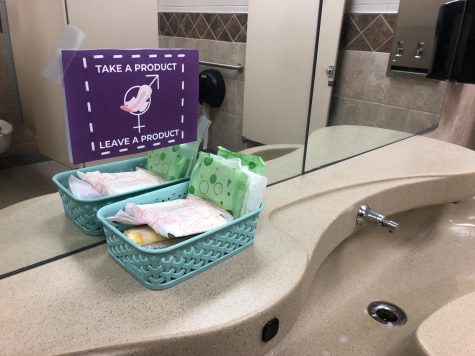
A TAPLAP basket rests on the sink in a City High women’s bathroom.
While the project is still in its pilot phase, Lavezzo-Stecopoulous hopes that this tradition of sharing in the struggle that accompanies monthly menstrual bleeding will continue on to establish a sustainable solution to this problem.
“Words of advice I would give to those who might be left without the products that they might need? Don’t let that ever stop you,” said Lavezzo-Stecopoulos. “This is something that should be readily available to you because [menstruation is] not anything that’s within your control. It’s a natural occurrence. You should do what you can to make it so you and your peers that also bleed can go throughout the day as they normally would, without being inconvenienced.”
Your donation will support the student journalists of Iowa City High School. For 2023, we are trying to update our video and photo studio, purchase new cameras and attend journalism conferences.

Nina has a passion for features stories. Listening and sharing students' stories is an honor to her. For Nina inspiration comes from listening to her peers...


